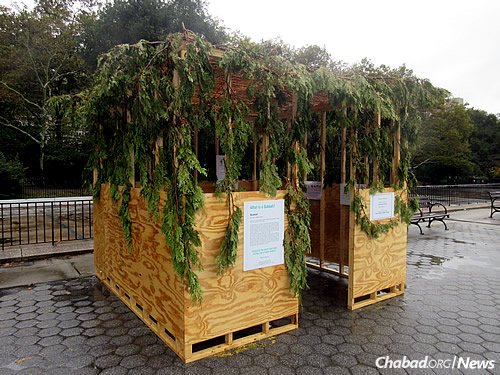Prof. Sam Lehman-Wilzig – A Funny (but Deadly Serious) Sukkah Joke for our Time
With the holiday of sukkot approaching, I am reminded of my favorite Jewish joke. For reasons to be discussed below, I realize for the first time that the joke also has a serious message, highly relevant to our times, given the news of late. But first the joke:
In a 19th century shtetl, a very poor Jew named Shmuel dreamed every year of building his own sukkah from scratch. One year, he finally managed to save enough kopecks to purchase the materials. After buying all that he needed, he asked his rabbi: “Are there any Jewish sources that could help me build the sukkah exactly according to the halakha?”
The rabbi replied: “Absolutely! Go to Tractate Sukkah. In chapter 1 you’ll find everything you need, especially if you follow Rashi’s explicit explanations and instructions.”
Shmuel hurried home, opened the Talmud, and sure enough there were Rashi’s explanatory instructions. He followed them exactly.
Came the evening of Sukkot, Shmuel went to synagogue and after the service arrived home. He entered the beautiful, little sukkah, lavishly decorated by his children; his heart was bursting with joy. As was customary, he started with kiddush. Halfway through, a slight gust of wind breezed by – and the entire sukkah collapsed inwards!!
Shmuel was distraught and made a beeline across the shtetl. Bursting into the rabbi’s sukkah, he agitatedly asked: “Rabbi, I did everything Rashi instructed! Why did a small breeze cause the sukkah to collapse?”
The rabbi looked at Shmuel, stroked his beard a few times and then replied: “You know, the later commentator Tosefot asks the same question!”
What’s funny about this joke is that the rabbi’s response “repeats” a classic line from yeshiva Talmud study, but in a ridiculous situation. However, it is also funny and sad because the rabbi was so ensconced in “academic” study that he didn’t have the presence of mind to realize that the entire Talmudic discussion with the commentaries had real, practical relevance. And the joke is completely tragic, given that the rabbi was “warned” way ahead of time about the ensuing disaster – but didn’t take heed to inform lowly, poor Shmuel.
Sound familiar? If not, think of Mount Meron. How many lives would have been saved this past April 30 in Israel if the celebrants (and their leaders) had heeded the warnings of the authorities and taken steps to avoid the disaster of the ensuing “crowd collapse”?
Are Israelis – and people in general – fated to repeat this same mistake over and over? Not necessarily. A “miraculous” thing occurred in the city of Holon, Israel, this past week. When some cracks started appearing in an old building, the municipal engineer was called in. After a short, spot inspection, he demanded that all the residents leave immediately. Amazingly (with some cajoling; after all, this is Israel), they did leave their homes within a very short time. The entire building collapsed the next day! No one was even injured.
If you think that these are localized, isolated cases – think again. It is no different than the medical authorities last year (and this) calling for everyone to be vaccinated against the Coronavirus, and to wear masks. Yet despite the urgent warning, millions of Americans and Europeans (and tens of thousands of Israelis) have refused to do so. The outcome: disaster, mainly for the unvaccinated. In Israel this week, the Health Ministry announced that the unvaccinated were many times more likely die from Covid-19 than were those vaccinated twice – and the ratio is even greater compared to those who received a third booster shot.
Rashi and Tosefot lived centuries ago. We don’t have forewarnings today centuries in advance, but on the most critical issue facing the world we certainly have had several decades advance warning: global heating and climate change. Our Earth sukkah is definitely teetering; we should have been heeding the scientific “Prophets of Doom” from the start, but it seems that humans are generally not “built” for action until the house really falls on our head.
So, as you sit in a sukkah this coming week, think of its symbolism: we live in a world of great tenuousness. When it comes to potential danger, heed the authorities. That goes for Talmudic scholars and average home dwellers alike.









